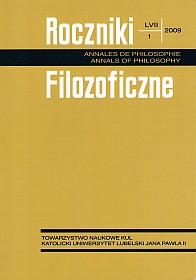Conditions of the Biological Emergence in the Light Of Debate between the Reductionism and the Emergentism
Abstract
The relation of emergence allows to understand life as a key emergent quality for the biology. We find number of examples of emergent phenomena in the chemistry and in the biology. However, there is a lack of a clear explication of understanding both the emergence and its biological exemplification. Conditions of the biological emergence, which are formulated in the current literature, help to fill that gap and to provide a satisfying definition of that relation. At the same time it throws a new light on the debate for a research paradigma between the reductionism and the emergentism. After a time of underlying differences, today the main attention is given to their likeness and possibilities for cooperation of those two apprehensions.
References
Boogerd, F. C., Bruggeman F. J., Richardson R. C., Stephan A., Westerhoff H. V. [2005]: Emergence and Its Place in Nature: A Case Study of Biochemical Networks, „Synthese” 145, s. 131-164.
Broad, C. D. [1925]: The Mind and Its Place in Nature, London: Trubner and Co.
Clayton, P. [2006]: Conceptual Foundations of Emergence Theory, [w:] P. Clayton, P. Davies (red), The Re-Emergence of emergence. The Emergetist Hypothesis from Science to Religion, Oxford.
Dziadkowiec, J. [2008]: Organizmalizm L. von Bertalanffy’ego a organicyzm A.N. Whiteheada, nieopublikowany.
Hempel, C., Oppenheim, P. [1948]: Studies in the Logic of Explanation, „Philosophy of Science” 15, s. 135-175.
Kauffman, S., Clayton, P. [2006]: On emergence, agency, and organization, „Biology and Philosophy” 21, s. 501-521.
Kim, J. [2006a]: Being Realistic about Emergence, [w:] P. Clayton, P. Davies (red.), The Re-Emergence of emergence. The Emergentist Hypothesis from Science to Religion, Oxford.
Kim, J. [2006b]: Emergence: Core ideas and issues, „Synthese” 151, s. 547-559.
Koj, A. [2006]: Zjawiska emergencji w biologii, [w:] M. Heller, J. Mączka J. (red), Struktura i Emergencja, s. 153-160, Kraków: Biblos.
Korn, R. W. [2005]: The Emergence Principle in Biological Hierarchies, „Biology and Philosophy” 20, s. 13-151.
Kuhn, T. S. [1962]: The Structure of Scientific Revolutions, Chicago: University of Chicago Press.
Lewes, G. H. [1875]: Problems of Life and Mind, 2 vol., London: Kegan Paul, Trench, Turbner, and Co.
Luisi, P. L. [2006]: The Emergence of Life. From Chemical Origins to Synthetic Biology, Cambridge: Cambridge University Press.
Marras, A. [2006]: Emergence and reduction: Reply to Kim, „Synthese” 151, s. 561-569.
Morange, M. [2006]: Post-genomic, Between Reduction and Emergence, „Synthese” 151, s. 355-360.
Morgan, C. L. [1923]: Emergent Evolution, New York: Henry Holt and Co.
Nagel, E. [1961]: The Structure of Science, New York: Hercourt, Brace and World.
Poczobut, R. [2000]: Superweniencja. Zarys problematyki, „Filozofia Nauki” 8, 2 (30), s. 25-44.
Robinson, W. S. [2005]: Zooming in on Downward Causation, „Biology and Philosophy” 20, s. 117-136.
Whitehead, A. N. [1978]: Process and Reality. An Essay in Cosmology, New York: The Free Press.
Wójcik, B. [2003]: Superweniencja a naturalizm, „Roczniki Filozoficzne” 51, z. 3, s. 65-75.
Życiński, J. [2003]: Naturalizm ontologiczny a rola superweniencji w ewolucji biologicznej, „Roczniki Filozoficzne” 51, z. 3, s. 7-18.
Copyright (c) 2009 Roczniki Filozoficzne

This work is licensed under a Creative Commons Attribution-NonCommercial-NoDerivatives 4.0 International License.





